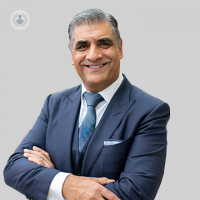Cardiac surgery without blood
Mr Inderpaul Birdi - Cardiothoracic surgery
Created on: 11-13-2012
Updated on: 11-15-2023
Edited by: Conor Lynch
What is cardiac surgery without blood?
Cardiac surgery without blood is a safe alternative for patients who have serious heart conditions but cannot or choose not to receive any blood or blood products (red cells, white cells, plasma or platelets).

What happens during cardiac surgery without blood?
During bloodless heart surgery, physicians use meticulous surgical techniques and innovative procedures that minimise surgical blood loss and avoid the need for a transfusion during surgery. Bloodless heart surgery is a promising area of research that has gained significant attention in recent years.
What are the different kinds of cardiac procedures without blood?
One of the most effective bloodless cardiac surgeries is transcatheter aortic valve replacement (TAVR). TAVR is a minimally invasive procedure that involves replacing the aortic valve with a prosthetic valve through a small incision in the groin or chest. TAVR is a safe and effective alternative to traditional open-heart surgery for patients who are at high risk for complications from surgery or who are not candidates for surgery due to other medical conditions.
Another promising bloodless cardiac surgery is robotic-assisted heart surgery. Robotic-assisted heart surgery is a minimally invasive procedure that uses robotic arms to perform the surgery through small incisions in the chest. This type of surgery is less invasive than traditional open-heart surgery and can lead to faster recovery times and fewer complications.
Off-pump coronary artery bypass surgery (OPCAB) is another bloodless cardiac surgery that has shown promise in the treatment of heart disease. OPCAB is a type of heart surgery that does not require the use of a heart-lung machine. This type of surgery is less invasive than traditional open-heart surgery and can lead to faster recovery times and fewer complications.
What are the risks associated with cardiac surgery without blood?
Cardiac surgery without blood transfusion is a complex procedure that involves a higher risk of complications than traditional cardiac surgery. The risks associated with this procedure include:
- arrhythmias
- bleeding
- blood clots that can cause stroke or venous thromboembolism (VTE)
- damage to tissues including the heart, kidneys, liver, and lungs
- infection, fever, swelling, or other signs of inflammation at the incision site
- memory loss
- pneumonia
